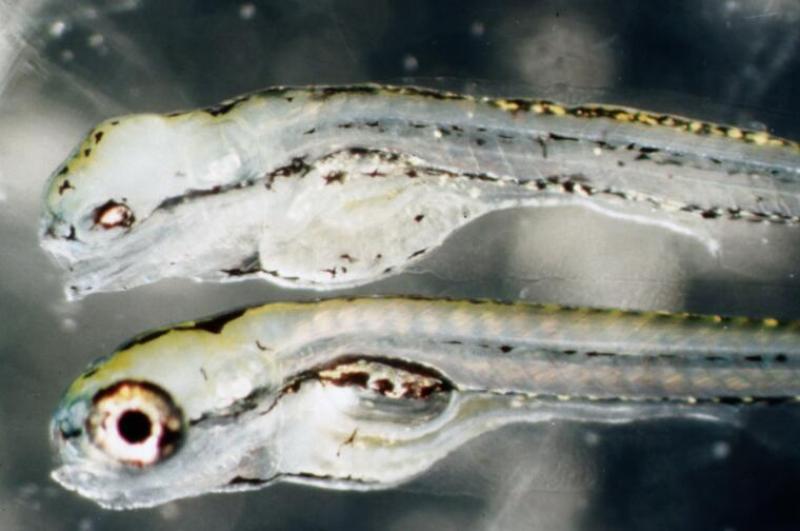Small but Mighty: the Surprising Role of Bacteria in Brain Development
by Eleonore Lebeuf-Taylor
30 November 2022

When Terry Van Raay’s team set out to deprive developing zebrafish of their normal symbiotic bacteria, he wasn’t sure what they would find. As it turns out, these microorganisms are hugely important to normal brain cell development, or neurogenesis.
In a new study published in Microbiome, recent PhD student Victora Rea and Van Raay, a professor in the Department of Molecular and Cellular Biology, show that the brains of zebrafish develop very differently when they’re microbe-free.
“We were trying to understand the contribution of the zebrafish embryo’s naturally-present microbes to the development of its neural system,” explains Van Raay.
To do so, they knocked out the microbiome of zebrafish a mere six hours after eggs were fertilized, at a point where the animal is not much more than a tiny ball of cells. They then looked at how a few crucial neurogenesis genes were expressed in the embryos’ brains using in situ observation methods.
The results shocked Van Raay.
“I just couldn’t believe it,” he says. “The pictures very convincingly showed a reduction in gene expression.”
The dramatic finding prompted a much deeper examination of over 2,000 genes involved in neurogenesis. This revealed that bacteria-free zebrafish had significantly reduced levels of gene expression. Not only that, but the usual variation in gene expression between individual fish virtually disappeared.
“The reduced gene expression was a much broader phenomenon,” explains Van Raay. “Being microbe-free didn’t shut down transcription completely, but it did send gene expression down to a baseline.”
It may not be the bacterial cells themselves that are crucial for normal brain development, but rather the molecules they release as metabolic by-products. Bacterial metabolites are small enough to enter the blood stream and even penetrate the brain of the animal host. To test whether it was these molecules, rather than live bacteria, that were affecting the zebrafishes’ neurogenesis, the researchers administered metabolites to embryos 24 hours into their development.
Here, too, the results were unequivocal: bacterial metabolites were essential for normal gene expression in developing zebrafish.
“A one-time dose of metabolites was sufficient to rescue, at least at some level, most of the affected gene expression,” says Van Raay. “And it’s important to note that in a normal environment, the zebrafish would be constantly exposed to bacteria and these regenerating metabolites.”

Zebrafish embryos (Photo credit:Dr Steve Wilson, Attribution 4.0 International CC BY 4.0)
Another surprise lay in store for Van Raay when the team looked closer into which specific genes were most dramatically affected by the lack of microbes.
“Several genes were perturbed, but those involved in a signalling pathway known as ‘Wnt’ seemed to be the biggest player,” explains Van Raay, who happens to specialize in this particular pathway and its role in development and disease.
“The Wnt pathway is essential for normal development in all multicellular organisms, but disruption in humans is linked to many diseases, including a number of neurological diseases like autism.”
Altogether, these findings offer highly promising avenues for future research. Van Raay points out that the lightning-fast development of their nervous system, coupled with the unvarying baseline gene expression of microbe-free individuals, makes zebrafish an ideal model organism.
“We now have a platform where we can start adding individual metabolites and see whether we can identify changes,” says Van Raay. “What’s more, zebrafish are easy to manipulate genetically, grow fast and are easy to maintain.”
Further work in these small fish may yield insights into human neurological disorders: the zebrafish brain structure is surprisingly similar to the human brain, despite being only approximately half a millimetre wide at the embryonic stage. Humans, like zebrafish, have coevolved with a symbiotic community of bacteria whose roles are still largely unknown.
For Van Raay and his multidisciplinary colleagues in CBS, what started as a toe-dip exploration into the role of the microbiome on brain development has turned into much more. Additional studies are already in the works to explore how different microbiomes—for instance, those associated with autism, depression, or a poor diet—might affect how the zebrafish brain develops and functions.
These small fish, along with their mighty symbiotic bacteria, no doubt have many more surprises in store.
Read the full study in the journal Microbiome.
Read about other CBS Research Highlights.